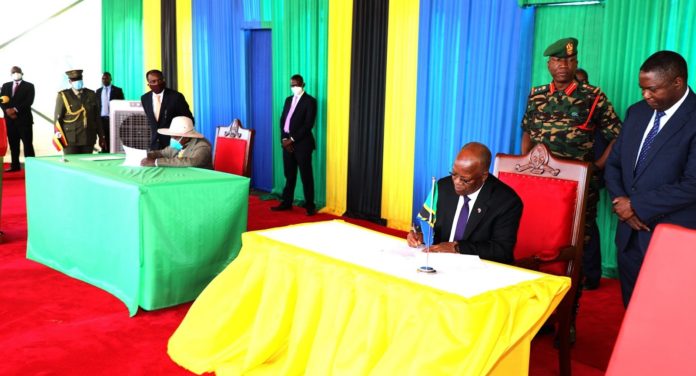Dar es Salaam, Tanzania — Uganda and Tanzania have signed a multibillion dollars deal that officially kicks off the construction of a 1,445km pipeline to transport crude oil from the landlocked country to the port city of Tanga on the Indian Ocean.
Ugandan President Yoweri Museveni and his Tanzanian counterpart, John Magufuli on Sunday witnessed signing of the agreement to build what they claim as world’s longest oil pipeline stretching from the shores of lake Victoria to the Indian Ocean. The $3.5 billion pipeline, whose building starts in March 2021, is perceived as a milestone for the economies of the two countries.
Huge Crude Oil Treasure
Uganda discovered huge reserves of commercially viable crude oil in 2006. The landlocked country has approximately 6 billion barrels of oil and plans to bring some of it on stream by 2023-24 to vitalize its economy.
Speaking at the signing occasion President Museveni said citizens of Uganda and Tanzania will soon start to enjoy shared benefits of the crude oil resources.
“It’s good that we have now finalised the debate and negotiations about the discovered oil, the project has to take off with immediate effect to benefit people in both countries,” he said.
The move comes barely a week after the French energy giant—Total, a major investor in Uganda’s oil industry, struck a deal with Ugandan authorities by clearing administrative snags that were delaying implementation of the project.
“The conditions are set for the ramp-up of project activities and in particular, we will resume the land acquisition activities in Uganda while respecting the highest human rights standards,” Total Uganda said in a statement.
According to President Museveni, the investors will initially tap 6.5 billion barrels of crude oil, of which, 60 percent of the profit obtained will go to Tanzania and the remaining 40 percent will be for Uganda.
Displacement Of Communities
However, campaigners have raised eye brows on possible displacement of 12,000 families located along the corridor of the proposed pipeline and destruction of vital ecosystems in the vicinity.
Human rights activists say the multi-billion dollar investment could spell disaster for local people and trigger loss of land and livelihoods since it has it did not consider the concerns raised by thousands of farmers and pastoralists whose livelihoods will be at stake.
Campaigners said people fear that they would not receive a fair compensation urging the French energy giant and its partners to clear any obstacles on land valuation and compensation process.
Human Rights Concerns
A report on the Human Rights Impact Assessment; titled, ‘Empty Promises Down the Line: A human Rights Impact Assessment of the East African Crude Oil Pipeline’ published last week by Oxfam and other charities highlight several risks the project pose for communities located along the proposed pipeline corridor in Uganda and Tanzania.
Meanwhile Total welcomed some of the findings in the reports. “The project was designed with the overarching concern of minimizing and mitigating the impacts on local communities and in particular the need to relocate households,” the company said in a statement.
Salum Mnuna, Tanzania’s coordinator of the East African Crude Oil Pipeline (EACOP) said the company is on the verge of reaching similar agreement with Tanzania whose territory the pipeline will cross.
All Is Well
The company said it will consider the recommendations proposed in the report “Total welcomes and agrees with many of Oxfam’s suggestions and recommendations. Again, Total recognizes the value of the community-based approach taken to Oxfam in this assessment as it is complementary to the engagement and consultation with affected communities” the company said in a statement.
The company described the charity’s recommendations as “valuable and useful,” adding that it would take them as a basis to progress.

